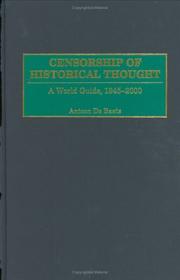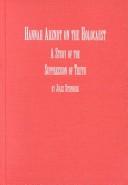| Listing 1 - 6 of 6 |
Sort by
|
Book
ISBN: 2707610712 9782707610713 Year: 1999 Volume: 14 Publisher: Paris: Montchrestien,
Abstract | Keywords | Export | Availability | Bookmark
 Loading...
Loading...Choose an application
- Reference Manager
- EndNote
- RefWorks (Direct export to RefWorks)
Censorship --- Islam and literature --- history --- Rushdie, Salman --- Iran --- Foreign relations --- Censorship - history - 20th century --- Rushdie, Salman - Censorship --- Iran - Foreign relations - 1979-1997

ISBN: 0313311935 9780313311932 Year: 2002 Publisher: Westport: Greenwood,
Abstract | Keywords | Export | Availability | Bookmark
 Loading...
Loading...Choose an application
- Reference Manager
- EndNote
- RefWorks (Direct export to RefWorks)
Censorship --- Freedom of the press --- history --- History --- Censure --- Liberté de la presse --- Histoire --- 20th century --- Censorship - history - 20th century --- Freedom of the press - History - 20th century

ISBN: 0889467196 Year: 1990 Publisher: Lewiston ; Queenston ; Lampeter E. Mellen Press
Abstract | Keywords | Export | Availability | Bookmark
 Loading...
Loading...Choose an application
- Reference Manager
- EndNote
- RefWorks (Direct export to RefWorks)
Book
ISBN: 9782853997812 2853997812 Year: 2011 Publisher: Aix-en-Provence: Publications de l'Université de Provence,
Abstract | Keywords | Export | Availability | Bookmark
 Loading...
Loading...Choose an application
- Reference Manager
- EndNote
- RefWorks (Direct export to RefWorks)
Censorship --- Freedom of expression --- Intellectual freedom --- Censure --- Liberté d'expression --- Liberté de pensée --- Freedom of speech --- history --- History --- Liberté d'expression --- Liberté de pensée --- Censorship - history - 20th century --- Freedom of expression - History - 20th century
Book
ISBN: 9782742774326 2742774327 Year: 2008 Publisher: Arles: Actes Sud,
Abstract | Keywords | Export | Availability | Bookmark
 Loading...
Loading...Choose an application
- Reference Manager
- EndNote
- RefWorks (Direct export to RefWorks)
Photography --- Photographie --- History --- Law and legislation --- Histoire --- Droit --- --Histoire --- --Exposition --- --2008 --- --Lausanne --- --catalogue --- --Photography --- Photography, Artistic --- Law and art --- Art --- Censorship --- Photography, Artistic. --- Exposition --- Photography - History - 20th century --- Photography - History - 19th century --- Law and art - History - 20th century --- Law and art - History - 19th century --- Art - Censorship - History - 20th century --- Art - Censorship - History - 19th century --- Lausanne --- DROIT A L'IMAGE --- PHOTOGRAPHES --- PHOTOGRAPHIE --- SCANDALES ARTISTIQUES --- Esthétique et morale --- DEONTOLOGIE --- PROCES --- CENSURE --- OPINION PUBLIQUE --- Aspect moral
Book
ISBN: 1283584123 9786613896575 0520953401 9780520953406 9780520273344 0520273346 9781283584128 6613896578 Year: 2012 Publisher: Berkeley : University of California Press,
Abstract | Keywords | Export | Availability | Bookmark
 Loading...
Loading...Choose an application
- Reference Manager
- EndNote
- RefWorks (Direct export to RefWorks)
At the height of state censorship in Japan, more indexes of banned books circulated, more essays on censorship were published, more works of illicit erotic and proletarian fiction were produced, and more passages were Xed out than at any other moment before or since. As censors construct and maintain their own archives, their acts of suppression yield another archive, filled with documents on, against, and in favor of censorship. The extant archive of the Japanese imperial censor (1923-1945) and the archive of the Occupation censor (1945-1952) stand as tangible reminders of this contradictory function of censors. As censors removed specific genres, topics, and words from circulation, some Japanese writers converted their offensive rants to innocuous fluff after successive encounters with the authorities. But, another coterie of editors, bibliographers, and writers responded to censorship by pushing back, using their encounters with suppression as incitement to rail against the authorities and to appeal to the prurient interests of their readers. This study examines these contradictory relationships between preservation, production, and redaction to shed light on the dark valley attributed to wartime culture and to cast a shadow on the supposedly bright, open space of free postwar discourse. (Winner of the 2010-2011 First Book Award of the Weatherhead East Asian Institute, Columbia University" ).
Prohibited books --- Expurgated books --- Japanese literature --- Censorship --- Banned books --- Bibliography --- Books, Prohibited --- Censorship of the press --- Children's literature --- Condemned books --- Press --- Books and reading --- Illegal libraries --- Books, Expurgated --- Printing --- Book censorship --- Books --- Literature --- Literature and morals --- Anticensorship activists --- Challenged books --- Intellectual freedom --- History --- Cancels --- Law and legislation --- Censorship -- Japan -- History -- 20th century.. --- Japanese literature -- Censorship -- History -- 20th century.. --- Expurgated books -- Japan -- History -- 20th century.. --- Prohibited books -- Japan -- History -- 20th century. --- 20th century japan. --- anthropology. --- asian history. --- books for history lovers. --- censorship japan. --- censorship system. --- censorship. --- discussion books. --- east asia. --- homeschool history books. --- japanese culture. --- japanese economy. --- japanese empire. --- japanese history. --- japanese imperialism. --- japanese isolation. --- japanese markets. --- learning while reading. --- leisure reads. --- life during war. --- nonfiction books. --- pass on books. --- passion reads. --- postwar discourse. --- quarantine books. --- rise of modern japan. --- wartime culture.
| Listing 1 - 6 of 6 |
Sort by
|

 Search
Search Feedback
Feedback About UniCat
About UniCat  Help
Help News
News